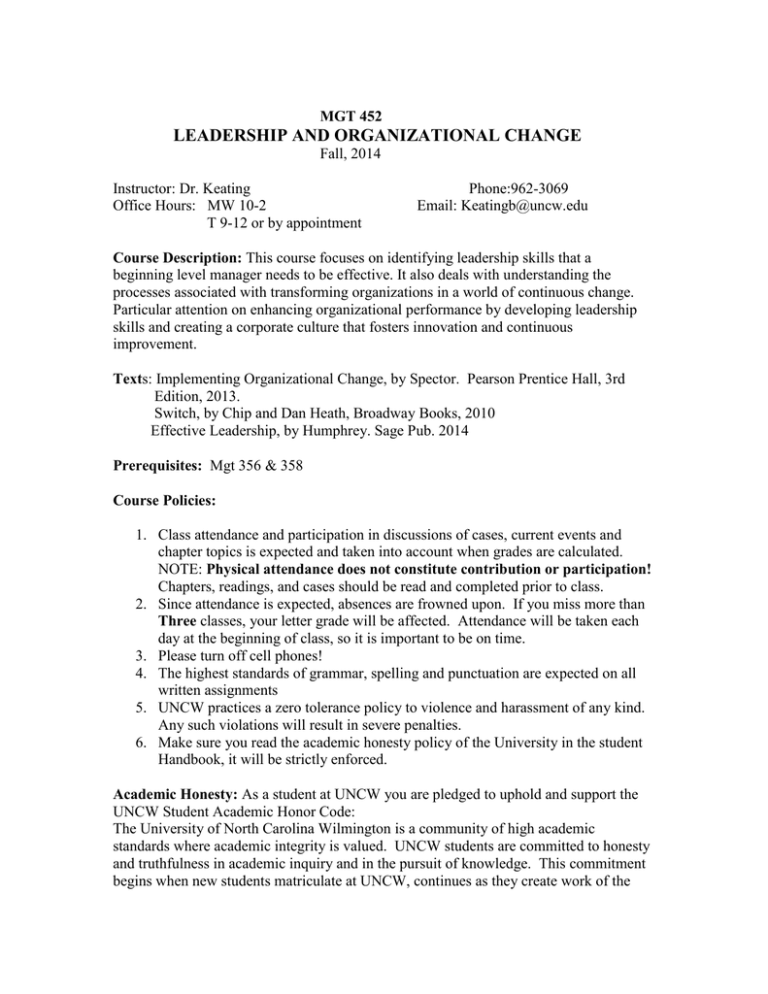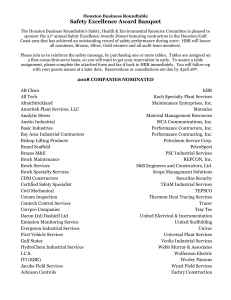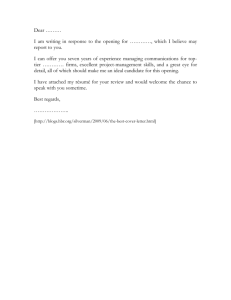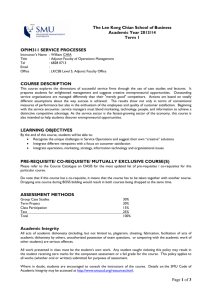
MGT 452
LEADERSHIP AND ORGANIZATIONAL CHANGE
Fall, 2014
Instructor: Dr. Keating
Office Hours: MW 10-2
T 9-12 or by appointment
Phone:962-3069
Email: Keatingb@uncw.edu
Course Description: This course focuses on identifying leadership skills that a
beginning level manager needs to be effective. It also deals with understanding the
processes associated with transforming organizations in a world of continuous change.
Particular attention on enhancing organizational performance by developing leadership
skills and creating a corporate culture that fosters innovation and continuous
improvement.
Texts: Implementing Organizational Change, by Spector. Pearson Prentice Hall, 3rd
Edition, 2013.
Switch, by Chip and Dan Heath, Broadway Books, 2010
Effective Leadership, by Humphrey. Sage Pub. 2014
Prerequisites: Mgt 356 & 358
Course Policies:
1. Class attendance and participation in discussions of cases, current events and
chapter topics is expected and taken into account when grades are calculated.
NOTE: Physical attendance does not constitute contribution or participation!
Chapters, readings, and cases should be read and completed prior to class.
2. Since attendance is expected, absences are frowned upon. If you miss more than
Three classes, your letter grade will be affected. Attendance will be taken each
day at the beginning of class, so it is important to be on time.
3. Please turn off cell phones!
4. The highest standards of grammar, spelling and punctuation are expected on all
written assignments
5. UNCW practices a zero tolerance policy to violence and harassment of any kind.
Any such violations will result in severe penalties.
6. Make sure you read the academic honesty policy of the University in the student
Handbook, it will be strictly enforced.
Academic Honesty: As a student at UNCW you are pledged to uphold and support the
UNCW Student Academic Honor Code:
The University of North Carolina Wilmington is a community of high academic
standards where academic integrity is valued. UNCW students are committed to honesty
and truthfulness in academic inquiry and in the pursuit of knowledge. This commitment
begins when new students matriculate at UNCW, continues as they create work of the
highest quality while part of the university community, and endures as a core value
throughout their lives.
Guidelines in support of the Honor Code, including definitions of cheating and
plagiarism, may be found at:
http://www.uncw.edu/policies/documents/03_100FINAL HONORCODE_Aug2009.pdf
Student Learning Outcomes:
This course satisfies the University Studies requirement for MLD students to take at least
one writing intensive (WI) course in your major. The common student learning outcomes
for WI courses that will be addressed in this course are:
WI 1. Locate appropriate sources of information to support written arguments. The case
format requires the student to understand the concepts from the texts, periodicals and
class discussions on leadership and organizational change processes. They then have to
apply these concepts to provide answers to the case issues.
WI 2. Evaluate and use evidence to generalize, explain, and interpret content. Through
class discussions the student is given the opportunity to share and to critique information
from their and other students case analyses. They can also bring in their own personal
experiences on dealing with leaders and changes in the workplace and identify effective
leadership practices.
WI 3. Demonstrate an understanding of the ethical use and citation of the ideas of others
used as supporting material in written work. Correct business citation format is reviewed
for books, periodicals, interviews, video and online content. A portion of the grade on all
written work is determined by the proper use of footnotes, reference citations,
quotations, and policy manual format. Format information and the avoidance of
plagiarism is covered in class, and students are also referred to the Randall Library
website for accurate citation information.
WI 4. Demonstrate the ability to write critically, using the conventions of the discipline.
The course prepares students to use business executive summary reports that firms
commonly use. These types of reports are very specific as to how the information is
presented and recommendations made to executives.
WI 5 Analyze and evaluate the claims, arguments, and theories presented in the course
by using appropriate methods (such as logical analysis and the identification of fallacies).
In addition to writing about why corporate leaders are successful, students also analyze
“what might go wrong” when issues are poorly identified, or leaders are ineffective.
What is not legal, not logical or not sufficient? Students learn from examining examples
of successful and less than successful corporate leaders.
Grading Scale: A 90-100
B 80-89
C 70-79
D 60-69
F < 60
Course Objectives:
We will be looking at two major areas in this class:
1. Leadership-what kinds of leadership skills are needed for today’s managers to
be effective, with particular emphasis at the first level of leadership.
2.. We will look at Organization Change from multiple lenses. Given that
change is the only constant in today’s environment, knowing how to deal with
change is imperative for tomorrow’s leaders.
Breakdown of Course Points:
Two Major Case Analyses, 15 points each
Exams 2 @ 20pts
Participation
Short, Two page summaries-three of them
30
40
15
15
100
Participation: It is crucial that you come prepared to class every day. Discussion
between students is an integral part of this class and you cannot make a good grade
without active participation of the material. Your opinions count and this class will help
you develop your presentation skills so necessary for tomorrow’s leaders.
I expect each of you to have a one page summary of the key points of the articles and
book chapters we will be looking at. At random times during the semester, I will collect
these summaries and review them to make sure you are getting the ideas proposed in the
articles.
Articles Most of the article can be found though the library’s website. It is cost free!
To access the articles: Go the UNCW’s home page and find library, click on it. There will
two boxes that pop up. Find the one that says. ‘looking for a journal’ and type in the
journal name. It will take you to the databases that have the journal (normally business
source premier) Click on data base and the years of the journal will be on the right.
Click on the appropriate year and each vol. will be listed. Find the right Vol. # and click
on it. The listing of article will appear, just find the article name, click on the pdf file and
Print a copy.
Exception!!!
The HBR requires a different access from the library’s web page.
Go to the library home page
Look at the tabs above the search box and click on Books & More
Click the radio button for Title
Type in HBR (type only HBR, not the full title) and click Go
Click on the link to HBR
Click on the Business Source Complete
This takes you to the record for Harvard Business Review in the database. Select year,
volume and issue (on the right side of the page. You can then print the article.
Class Schedule:
8/21 Introduction
8/26 Pearson- Chapter one-Organizational Change
Articles: Fast Company, March , 2000 Want to Lead Better? P. 58
Fast Company, June, 1999 The Leader of the Future p. 132
Article: HBR, Dec. 08 Fiat’s Extreme Makeover p. 45
Article: Fortune, Sept.6, 2010 Chrysler’s Speed Merchant
8/28 Article: Academy of Management Learning & Education, Sept.2011
(vol.10 #3) p.452 Becoming a leader” Early career challenges faced by MBA
Graduates
Article: HBR, Dec. 2013 How Google sold its engineers on management. 74
9/1 Off
9/3 Effective Leadership text, Chapter one-Leaders Matter
9/8 Pearson-Chapter 2- Theories of Effective Change Implementation
Article: HBR July/August 2011 Adaptability: The New Competitive Advantage
p.135
Article: HBR, June, 2012 Leadership is a conversation p.76
9/10 Switch, Chapters 1-4
9/15 Pearson-Chapter three- Mutual Engagement and Shared Diagnosis
Two page case-They bought in, now they want to bail out
9/17 Humphrey-chapter two, How personality traits influence leader emergence and
performance.
9/22 Humphrey-Chapter three-Cognitive intelligence, complex task performance, and
decision making.
9/24 Pearson-Chapter 4- Organizational Redesign
Article: HBR, May, 2011 The Frontline Advantage p.106
Article: HBR, Dec. 2012 Two Routes to Resilience p. 67
9/29 Pearson- Chapter 5- People Alignment
Article: HBR, March, 2010 How the Best Indian Companies Drive Performance
p.91
Article: HBR, June, 2010 A Maverick CEO explains how he persuaded his
His team to leap into the future p.110
10/1
Switch, Chapters 5-7
10/6 Exam # 1
10/8 First Case analysis Due
10/13 Fall break
10/15 Humphrey-Chapter 4, How emotional intelligence, skills, and competencies
increase leader effectiveness.
10/20 Humphrey-Chapter eight-The importance of affect and emotions to leadership
10/22 Pearson-Chapter 6 Reinforcing New Behaviors
Two page case # 2 The CEO who couldn’t keep his foot out of his mouth
10/27
Articles: HBR, June, 2009 A culture of Candor p. 54
HBR , Sept. 2006 The Decision to Trust, p.55
Why do employees resist change, HBR, M/J, 1996 p. 86
HBR, April, 2009 Decoding Resistance to Change p.99
10/29 Schein Article—Green room
Switch, Chapters 8-11
11/3 Humphrey-Chapter nine-self-leadership, empowerment, shared/distributed
leadership, and teams.
11/5 Chapter 7 Leading Change
Article: HBR, April, 2003 Tipping point leadership p.61
Article: CCL-accelerating performance-5 leadership skills you and your
organization can’t do without.
11/10 Article: Strategy & Business, Issue 54, winter 2011 Booz & Co. Why Culture
Is key
Article: Strategy and Business, Issue 69, Winter 2012 Booz & co. Making Ideas
Work
Article: Fast Company, August, 2001 Tricon Restaurants p.80
11/12 Article: HBR J/A, 1994 Good Communication That Blocks Learning p.77
Article: Fast company, Nov. 2012 Secrets of the Flux Leader p. 96
11/17 Humphrey-Chapter fifteen-Transformational leadership, change and sensemaking
perspectives
Second Case Analysis Due
11/19 Article: HBR, Sept. 2010 Mistakes leaders keep making p. 86
Third two page case: Who stays, who goes?
11/24 Article: HBR Sept. 2011 How to Cultivate Engaged employees p.123
Article: HBR J/F, 2012 Creating sustainable performance p.93
Article: HBR, J/A, 2012 Cultural change that sticks p.110
11/26 Off Thanksgiving
12/1 EI Article: Journal of Organizational Behavior, July, 2011 p.788
The relation between EI and job performance: A meta-analysis
12/3
Article: HBR, April, 09 Leadership lessons from Abe Lincoln, p.43
Article: HBR, Sept. 2010 When Emotional Reasoning Trumps IQ p. 27
Article: HBR, Sept. 2010 The Boss as a human shield p. 106
Final Exam




